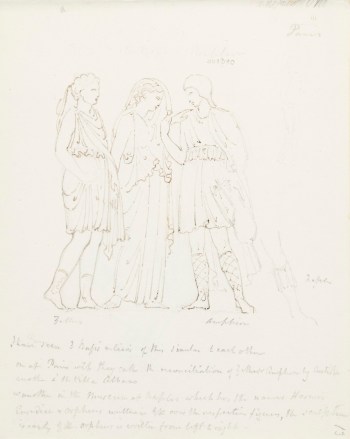Hermes (Greek deity)
Hermes (Greek deity)
RA Collection: People and Organisations
Deity in Ancient Greek religion and mythology. Hermes is considered as the herald of the gods, as well as the protector of human heralds, travellers, thieves, merchants, and orators. He is able to move freely between the worlds of the mortal and the divine, playing the role of the psychopomp or “soul guide” — a conductor of souls into the afterlife. In myth, Hermes functioned as the emissary and messenger of the gods, and was often presented as the son of Zeus and Maia, the Pleiad. He is also regarded as “the divine trickster,” for which Homer offers the most popular account in his Hymn to Hermes.
Works associated with Hermes (Greek deity) in the RA Collection
6 results
-

Claude Randon
The Hermes of the Museo Pio-Clementino (once known as Belvedere Antinous), 1704
Engraving with some etching
-

Claude Du Bosc
Hermes, [1730?]
Engraving
-

Unsigned
Vignette of Hermes balancing on a globe., 1678
Woodcut
-

Richard Westmacott the Younger RA
Sketch of a bas relief depicting Orpheus and Eurydice with Hermes, c. 1820 - 1826
Pen and ink over pencil on wove paper
-

Attributed to Praxiteles
Cast of Bust of Hermes (from the group 'Hermes with the Infant Dionysus'), ca. 350-330 B.C
Plaster cast, 19th century
-

From: Museo Archeologico Nazionale di Napoli
Cast of three-figured relief depicting Hermes, Eurydice, and Orpheus
Plaster cast





